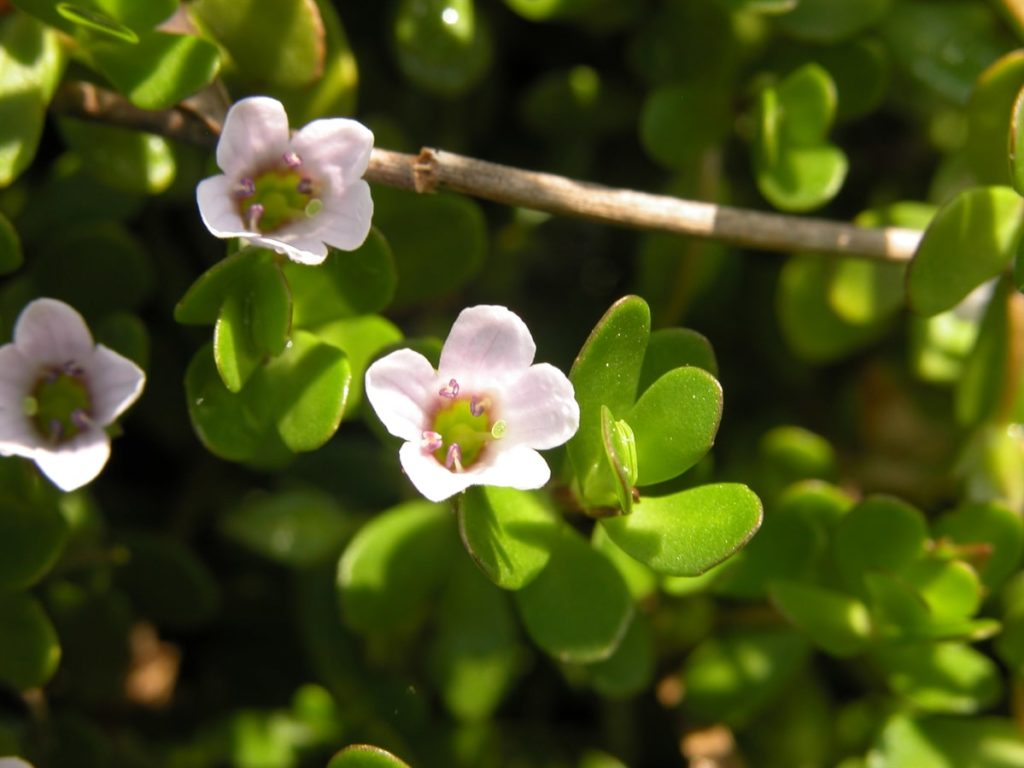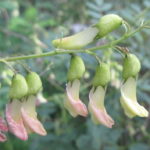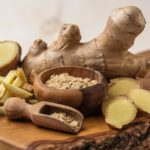
Megan Rodden
(BCS, DipNat, MedHerb, NMHNZ)
Jump to:
Bacopa is an ancient herb, and over many centuries it has been used for many different purposes and conditions. Today’s studies and research are conclusive, and we can say with certainty that Bacopa can assist with
- brain health and cognitive actions of Bacopa
- ADHD symptoms in children
- mental health and mood
and is also a potent antioxidant and anti-inflammatory.
Introduction
Bacopa has a rich medicinal and religious history of over 1400 years. In India, Bacopa is ranked second on the list of essential foods.[1]
Bacopa was said to be used to help memorise lengthy sacred hymns and scriptures in ancient Vedic times. The Vedics referred to Bacopa as the “rejuvenator of the intellect”.[2]
Bacopa is looked upon as the brain and nervous system booster, along with the leaf juice being applied to inflamed areas to treat rheumatism.
Other names
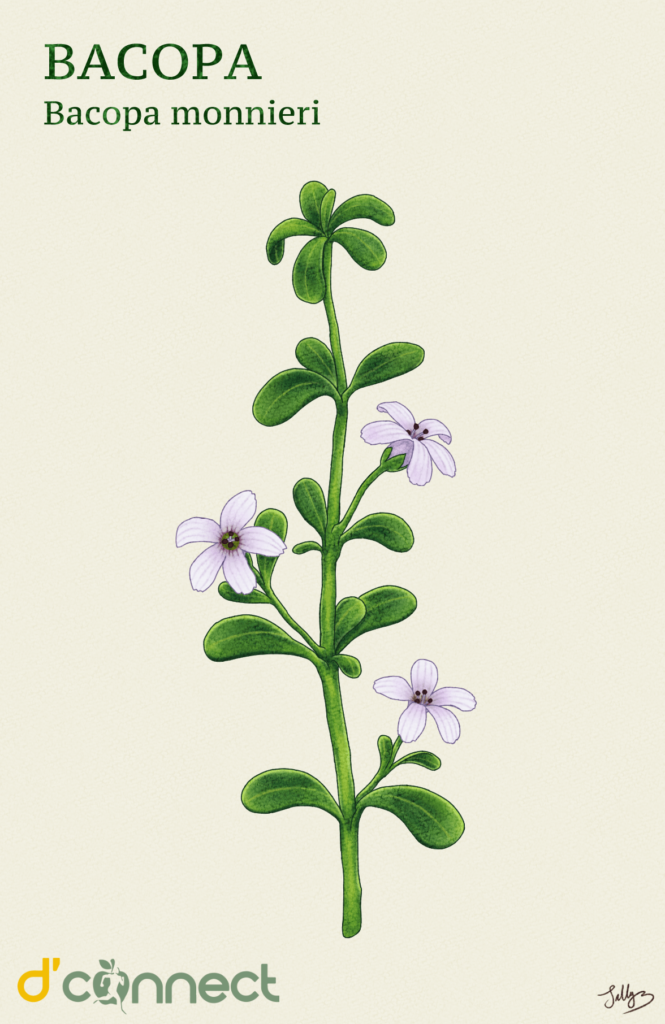
Botanical name (latin binomial): Bacopa monnieri.
Brahmi: a colloquial term that originates from the Hindu creator-god Brahma.
Herpestis monnieri.
Other names: Indian pennywort, thyme-leafed gratiola, water hyssop and herb of grace.[3]
Characteristics
Bacopa is from the scrophulariaceae family, a small creeping perennial with purple flowers and oblong leaves.
Native to Australia and India, bacopa is often found in wetlands and as a weed in rice fields. East Asia and America are also home to this wonderful herb.[2]
Key constituents:
- Triterpenoid saponins (Bacosides)
- Alkaloids (brahmine, nicotine, and herpestine)
- D-Mannitol and hersaponin
Use
Bacopa has been used for centuries in a range of traditional medicines. Today bacopa continues to be a popular herb used in natural therapies with the wide range of benefits it offers.
Traditional use
Bacopa has been used traditionally in Ayurvedic medicine for conditions such as:
- Fever
- Inflammation
- Asthma
- Epilepsy
- Pain
- Memory support
- Asthma
- Insomnia
- Anxiety
Traditionally it is said to promote calm, intelligence and wisdom.
Medicinal use
Health benefits
Cognitive actions of Bacopa
Oxidative stress plays a significant role in aging the brain and common diseases associated with cognitive decline. Alzheimer’s disease is caused by neuritic plaques and neurofibrillary tangles within the brain, which lead to cognitive impairment and dementia.
Bacopa suppresses plaque deposits in the brain and shows significant memory enhancing effects, facilitating acquisition, retention and recovery.[7]
A number of studies highlight Bacopa’s cognitive enhancing actions, with evidence of benefits to memory and speed of attention.[8]
Bacopa enhances memory and attention
One trial using 300mg of Bacopa, in healthy elderly volunteers, found significant improvement in memory scores and enhanced speed when discerning information after 12 weeks of treatment.[9]
A further trial studying elderly with memory impairment found improvement in cognitive function using standardised Bacopa extract. The results showed improvement in cognitive functions, such as attention and verbal memory after receiving a single dose of 450mg of Bacopa extract (Bacomind) for 12 weeks.[10]
Bacopa supports repairing damaged neurons by upregulating neuronal synthesis, which is where electrical signals are converted into a chemical signal that can easily be passed on to the next neuron and then converted back to electrical signals.
Bacosides within bacopa strongly impact neuronal health with
- anti-inflammatory
- antioxidant
- antidepressant
- neuroprotective actions[11]
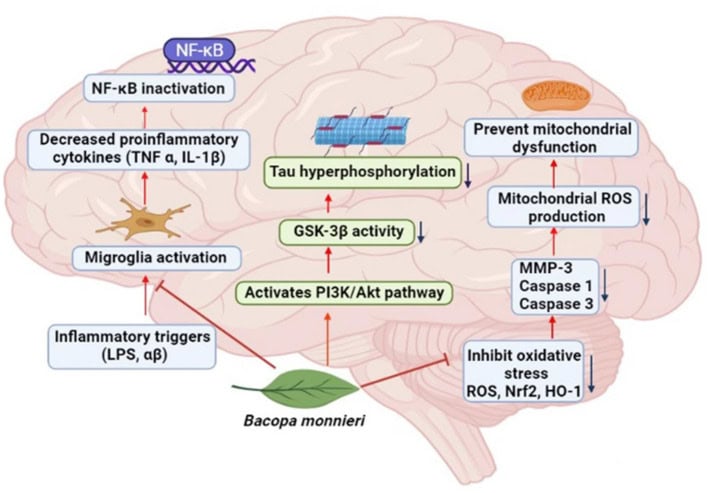
Pathways demonstrate the antioxidant properties preventing mitochondrial dysfunction, anti-inflammatory effects of bacopa and prevention of Alzheimer’s disease.
Bacopa and ADHD in children
The cognitive benefits of Bacopa in adults has led to increasing interest in emerging benefits with the study of Bacopa for children with Attention Deficit Hyperactivity Disorder (ADHD).
A recent trial, published in 2022, found improvements in
- cognitive outcomes
- mood and sleep
in 112 males aged 6-14 years with an ADHD diagnosis. After 14 weeks of treatment with Bacopa extract, the researchers found statistically significant improvements in
- cognitive flexibility
- executive functioning
- interpersonal problems
- sleep routine
in those taking Bacopa over placebo.[12]
Bacopa can assist with ADHD
Another study in 31 children also found Bacopa extract (225mg daily) showed the following
- improved attention-deficit symptoms, including self-control and restlessness, in 85% of the children
- 74% of the children showed up to a 20% reduction in the total symptom scores for ADHD
- 26% of children showed between a 21% and a 50% reduction in the total symptom scores for ADHD[13]
Anxiolytic and antidepressant actions of Bacopa
Bacopa has been shown to be effective in supporting anxiety and depression. One clinical study in 198 patients showed a decrease in the severity of anxiety and depression with the use of 500mg twice a day, for 30 days.[14]
Another study also showed a significant decrease in anxiety and depression scores along with improved cognitive performance in healthy elderly people with the use of 300 mg/daily of Bacopa extract compared to placebo over 12 weeks of treatment.[10]
Bacopa was demonstrated to reduce anxiety where noradrenaline and dopamine were normalised within the hippocampus in stress induced rats.
Anticancer actions of Bacopa
Bacopa has shown anticancer properties. More specifically, Bacopaside II initiates autophagy, which is the body’s way of cleaning up and reusing old and damaged cell parts.
One in vitro study highlighted this anticancer effect using purified Bacopa extract to treat colon cancer cells. The growth of the cancer cells was inhibited with the Bacopa extract causing the cells to die.[15]
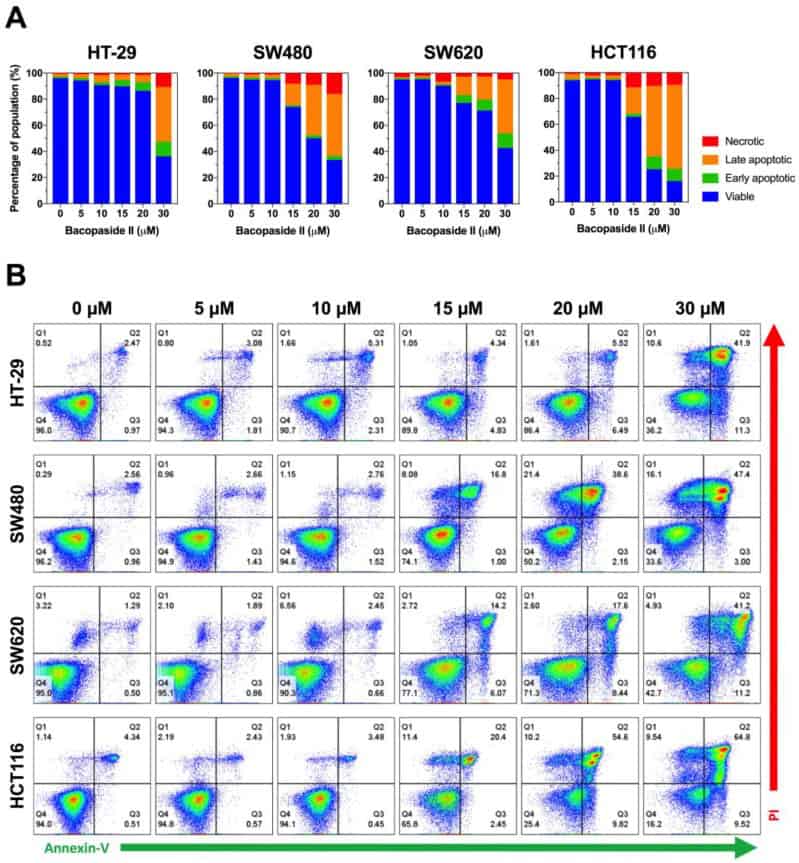
(A) Representative plots, showing viable (Q4, double negative), early apoptotic (Q3, annexin V positive), late apoptotic (Q2, annexin V and PI positive) and necrotic cells (Q1, PI positive).
(B) Percentage of the population of single cells in each quadrant. Results shown are representative of 3 repeated experiments.
Antioxidant actions of Bacopa
The brain is vulnerable to damage from free radicals. Harmful effects of oxidative stress can lead to brain disorders and speed up aging.
Antioxidant actions of Bacopa have been highlighted in animal studies. One study showed increased antioxidant activity (SuperoxideDismutase – SOD, Catalase CAT – Glutathione peroxidase – GPX) in the frontal cortex of rats after 14 days of treatment with Bacopa extract.
After 21 days of treatment with 10mg of Bacopa extract there was an 81% increase in antioxidant SOD activity in the frontal cortex.[16]
Bacopa’s bacosides enhance nerve impulse transmission and promote repair of damaged neurons. Bacopa has shown benefit in reversing diazepam-induced amnesia (memory loss).[17]
One 90 day trial, including 107 healthy participants, showed significant improvement in memory with standardised Bacopa extract (150mg x2) compared to placebo.
The participants were given a series of cognitive tests (Cognitive Drug Research – CDR) before and after treatment with those receiving Bacopa improving working memory and spatial memory.
Bacopa promotes repair of damaged neurons
A number of tasks were performed assessing a baseline score and post-treatment score with most scores improving in the Bacopa group over placebo, for example, spatial working memory increased by 5.9% while placebo only increased 2.5% and overall speed of attention improved 30% more than the placebo group.[18]
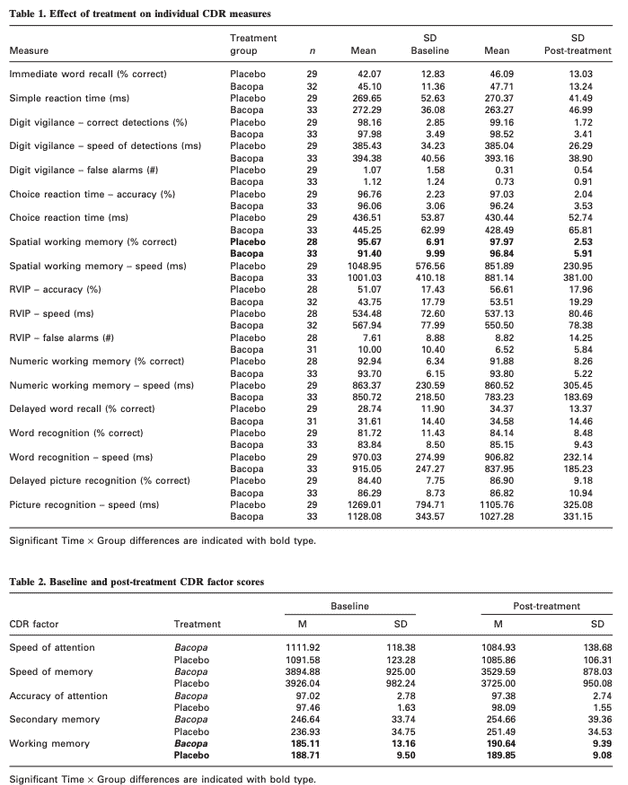
Anti-inflammatory actions of Bacopa
Systemic inflammation generally increases with age, however, it can also be present in younger years of life due to internal and external factors.
Bacopa’s key constituent, bacoside A, has been shown to reduce proteins and markers associated with inflammation in the brain and central nervous system.
For example, bacoside A reduced tumour necrosis factor TNF-a, which is an immune system messenger that can lead to chronic inflammation in the body.[19]
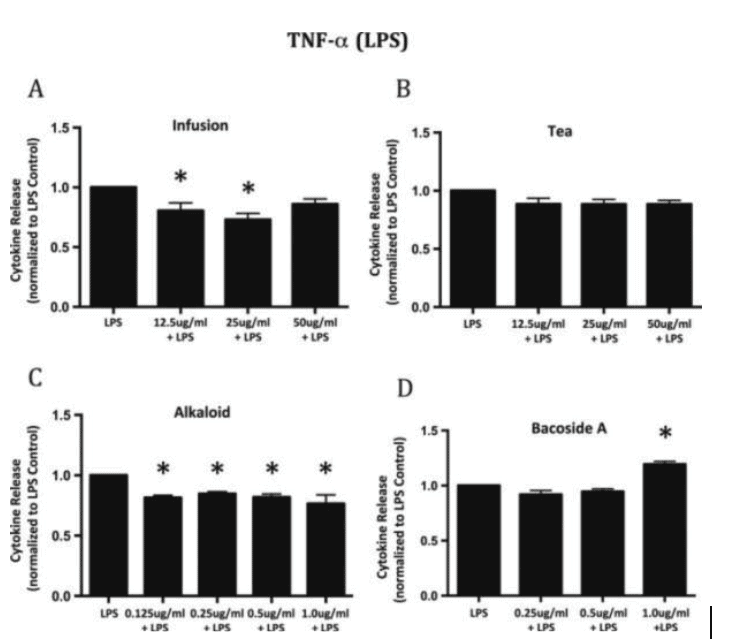
However, infusion A (A) and the alkaloid (C) showed significant inhibition of the release of TNF-a from activated microglia (immune cells) compared to the control groups, displaying the anti-inflammatory effects that bacopa has to offer (D).[19]
Therapeutic dosage
Bacopa can be used in various preparations such as:
- Tincture
- Infusion (tea)
- Ointment/cream
Therapeutic dosing of bacopa for an adult is considered:
- Fluid extract/tincture (1:2): 1.5ml – 4ml three times a day.
- Dried herb: 300-600mg once per day.
Safety concerns
Bacopa is generally a well-tolerated herb when used in appropriate doses. However, side effects can occur which include nausea, gastrointestinal upset and diarrhoea.
Bacopa is contraindicated in the below conditions/situations:
- Reflux (GORD)
- Pregnancy
- Breastfeeding
- Bradycardia
- Gastrointestinal tract obstruction
- Peptic ulcer disease
- Pulmonary conditions
- Urogenital tract obstruction
- Thyroid disorders[20,21]
Possible interactions with medications
As all herbs have strong effects within the body when used in therapeutic doses, interactions with medications always need to be considered.
Medications that should not be combined with Bacopa or require the supervision of a natural health practitioner are:
- Anticholinergic medications
- Cevimeline (Evoxac)
- Cholinergic medications
- Medications metabolised by enzymes CYP1A2, CYP2C19, CYP2C9, CYP3A4
- Thyroid medications[22]
It is advised to always consult your natural health practitioner before starting any herbal supplementation to ensure safety.
Possible interactions with herbs and supplements
Given that bacopa can have thyroid-stimulating actions, caution should be taken when combined with any other herbs or supplements that also have actions on the thyroid, such as
- Nigella Sativa
- Rhodiola
- Lemon balm
- Cordyceps
- Schisandra
- Ashwagandha (Withania somnifera)
Always check with your natural health practitioner to ensure safe use and suitability of herbal supplements.
Summary
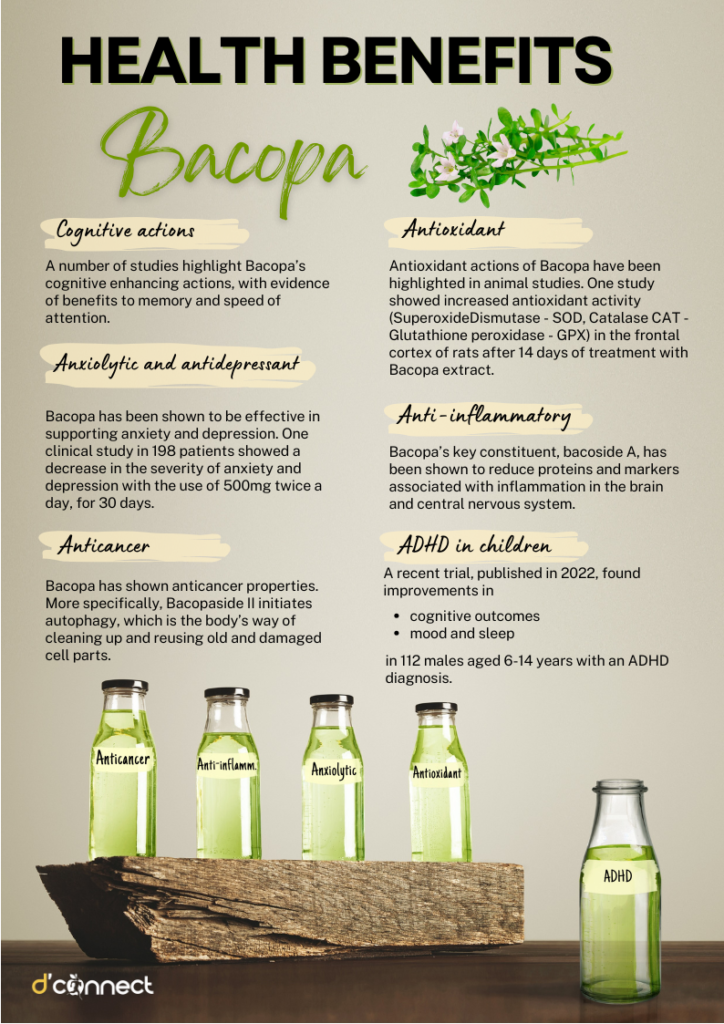
Note — feel free to share or download this illustration.
Related Questions
1. Who should not take Bacopa?
Anyone with the following condition or situation:
- Pregnancy
- Reflux (GORD)
- Breastfeeding
- Bradycardia
- Gastrointestinal tract obstruction
- Peptic ulcer disease
- Pulmonary conditions
- Urogenital tract obstruction
- Thyroid disorders
As well as anyone who is taking pharmaceutical medication who has not consulted their natural health practitioner first.
2. Is it safe to use Bacopa daily?
Yes, using Bacopa daily when taken following the correct dosing is safe.
3. Can Bacopa assist with ADHD?
Yes, due to its cognitive actions.
4. I want to take Bacopa, where can I get it from?
Your local health shop may stock this product or know where to source it.
Alternatively, discussing with your natural health practitioner ensures quality and suitability.
5. Does Bacopa contain vitamins and minerals?
Yes, but in smaller quantities, such as
Megan helps her clients to rebalance their bodies through holistic nutrition, herbal medicine and a naturopathic lifestyle. Her personal health journey transitioned her from a communications consultant to a naturopath, sparked by struggles with chronic health issues, particularly after having children and finding vital support from natural therapies…
If you would like to learn more about Megan, see Expert: Megan Rodden.
References
(1) Valotto Neto, L. J., Reverete de Araujo, M., Moretti Junior, R. C., Mendes Machado, N., Joshi, R. K., dos Santos Buglio, D., Barbalho Lamas, C., Direito, R., Fornari Laurindo, L., Tanaka, M., & Barbalho, S. M. (2024). Investigating the Neuroprotective and Cognitive-Enhancing Effects of Bacopa monnieri: A Systematic Review Focused on Inflammation, Oxidative Stress, Mitochondrial Dysfunction, and Apoptosis. Antioxidants, 13(4), 393. https://doi.org/10.3390/antiox13040393
(2) Aguiar, S., & Borowski, T. (2013). Neuropharmacological Review of the Nootropic Herb Bacopa monnieri. Rejuvenation Research, 16(4), 313–326. https://pmc.ncbi.nlm.nih.gov/articles/PMC3746283/
(3) Bacopa. (2014). Utep.edu. https://www.utep.edu/herbal-safety/herbal-facts/herbal%20facts%20sheet/bacopa.html#:~:text=Other%20Common%20Name%3A
(4) Simpson, T., Pase, M., & Stough, C. (2015). Bacopa monnierias an Antioxidant Therapy to Reduce Oxidative Stress in the Aging Brain. Evidence-Based Complementary and Alternative Medicine, 2015, 1–9. https://doi.org/10.1155/2015/615384
(5) Muszyńska, B., krakowska, A., Lazur, J., Szewczyk, A., & Opoka, W. (2018). Evaluation of Nutritional and Medicinal Properties of Bacopa Monnieri Biomass and Preparations. Acta Poloniae Pharmaceutica – Drug Research, 75(6), 1353–1361. https://doi.org/10.32383/appdr/92207
(6) Deo, Y. K., & C, R. K. R. (2013). Critical review on pharmacological properties of Brahmi. International Journal of Ayurvedic Medicine, 4(2). https://doi.org/10.47552/ijam.v4i2.238
(7) Mathur, D., Goyal, K., Koul, V., & Anand, A. (2016). The Molecular Links of Re-Emerging Therapy: A Review of Evidence of Brahmi (Bacopa monniera). Frontiers in Pharmacology, 7.
(8) Kongkeaw C, Dilokthornsakul P, Thanarangsarit P, Limpeanchob N, Norman Scholfield C. (2014). Meta-analysis of randomized controlled trials on cognitive effects of Bacopa monnieri extract. J Ethnopharmacol. ;151(1):528-35. doi: 10.1016/j.jep.2013.11.008.
(9) Calabrese C, Gregory WL, Leo M, Kraemer D, Bone K, Oken B. (2008). Effects of a standardized Bacopa monnieri extract on cognitive performance, anxiety, and depression in the elderly: a randomized, double-blind, placebo-controlled trial. J Altern Complement Med.Jul;14(6):707-13. doi: 10.1089/acm.2008.0018.
(10) Barbhaiya, H.C., Desai, R.P., Saxena, V.S., Pravina, K., Wasim, P., Geetharani, P., Allan, J.J., Venkateshwarlu, K., & Amit, A. (2008). Efficacy and Tolerability of BacoMind®on Memory Improvement in Elderly Participants – A Double Blind Placebo Controlled Study. Journal of Pharmacology and Toxicology, 3, 425-434.
(11) Fatima, U., Roy, S., Ahmad, S., Ali, S., Elkady, W. M., Khan, I., Alsaffar, R. M., Adnan, M., Islam, A., & Hassan, Md. I. (2022). Pharmacological attributes of Bacopa monnieri extract: Current updates and clinical manifestation. Frontiers in Nutrition, 9.
(12) Kean JD, Downey LA, Sarris J, Kaufman J, Zangara A, Stough C. Effects of Bacopa monnieri (CDRI 08®) in a population of males exhibiting inattention and hyperactivity aged 6 to 14 years: A randomized, double-blind, placebo-controlled trial.(2022). Phytother Res. doi: 10.1002/ptr.7372.
(13) Dave UP, Dingankar SR, Saxena VS, Joseph JA, Bethapudi B, Agarwal A, Kudiganti V. (2014). An open-label study to elucidate the effects of standardized Bacopa monnieri extract in the management of symptoms of attention-deficit hyperactivity disorder in children. Adv Mind Body Med. PMID: 24682000.
(14) Shetty SK, Rao PN, U S, Raj A, KS S, SV S. The effect of Brahmi (Bacopa monnieri (L.) Pennell) on depression, anxiety and stress during Covid-19. (2021). Eur J Integr Med. doi: 10.1016/j.eujim.2021.101898.
(15) Smith, E., Palethorpe, H. M., Tomita, Y., Pei, J. V., Townsend, A. R., Price, T. J., Young, J. P., Yool, A. J., & Hardingham, J. E. (2018). The Purified Extract from the Medicinal Plant Bacopa monnieri, Bacopaside II, Inhibits Growth of Colon Cancer Cells In Vitro by Inducing Cell Cycle Arrest and Apoptosis. Cells, 7(7), 81.
(16) Bhattacharya, S.K., Bhattacharya, A., Kumar, A. and Ghosal, S. (2000). Antioxidant activity of Bacopa monniera in rat frontal cortex, striatum and hippocampus. Phytother. Res.doi.org/10.1002/(SICI)1099-1573(200005)14:3<174::AID-PTR624>3.0.CO;2-O
(17) Prabhakar S, Saraf MK, Pandhi P, Anand A. Bacopa monniera exerts antiamnesic effect on diazepam-induced anterograde amnesia in mice. (2008). Psychopharmacology (Berl). doi: 10.1007/s00213-007-1049-8.
(18) Stough, C., Downey, L. A., Lloyd, J., Silber, B., Redman, S., Hutchison, C., Wesnes, K. A., & Nathan, P. J. (2015). Erratum: Examining the nootropic effects of a special extract of Bacopa monniera on human cognitive functioning: 90-day double-blind placebo-controlled randomized trial Phytotherapy Research. https://doi.org/10.1002/ptr.5441
(19) Nemetchek, M. D., Stierle, A. A., Stierle, D. B., & Lurie, D. I. (2017). The Ayurvedic plant Bacopa monnieri inhibits inflammatory pathways in the brain. Journal of Ethnopharmacology, 197, 92–100.
(20) Morgan, A., & Stevens, J. (2010). Does Bacopa monnieri Improve Memory Performance in Older Persons? Results of a Randomized, Placebo-Controlled, Double-Blind Trial. The Journal of Alternative and Complementary Medicine, 16(7), 753–759.
(21) Kar, A., Panda, S., & Bharti, S. (2002). Relative efficacy of three medicinal plant extracts in the alteration of thyroid hormone concentrations in male mice. Journal of Ethnopharmacology, 81(2), 281–285.
(22) Therapeutic Research Center. (2019). Welcome to the Natural Medicines Research Collaboration. Therapeuticresearch.com.

